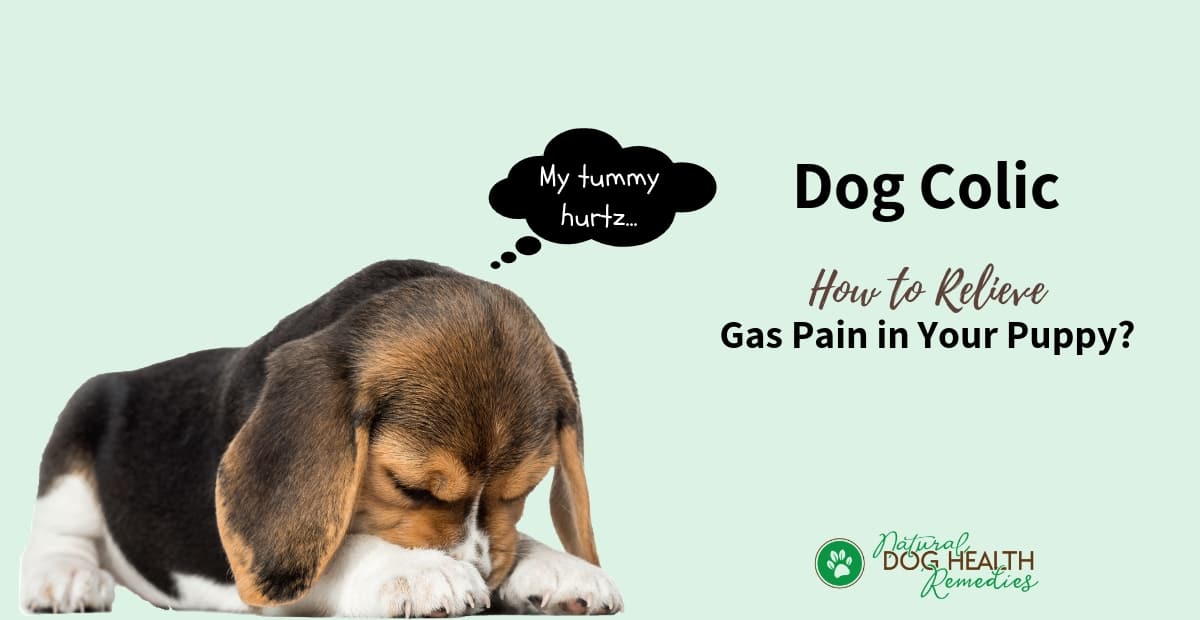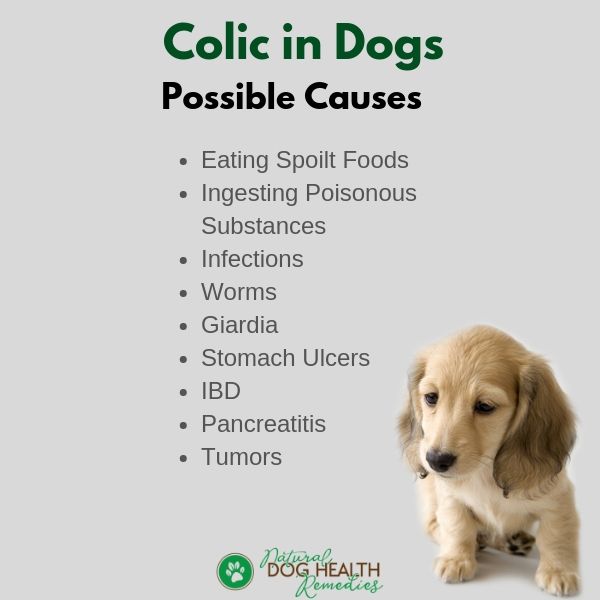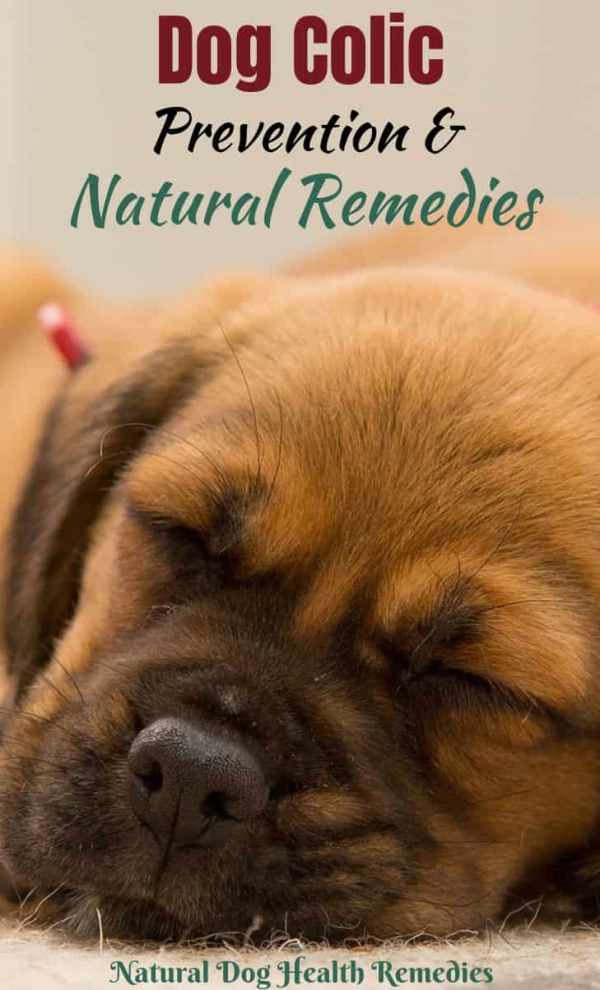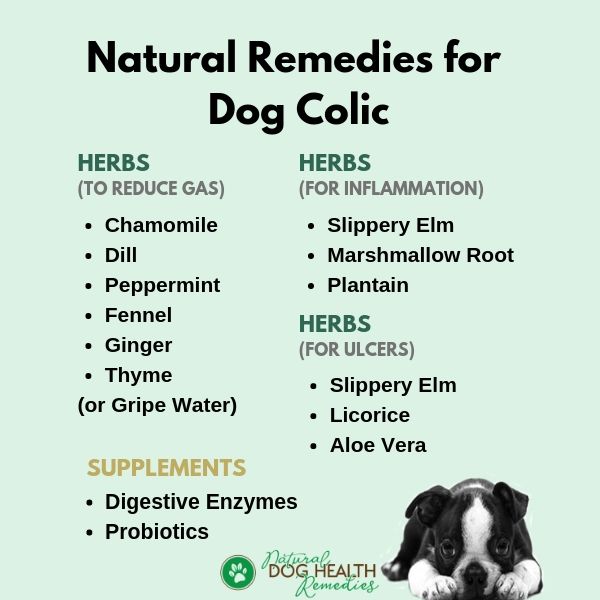Dog Colic
(FTC Disclosure: If you make a purchase via a link on this page, I may receive a small commission, at no added cost to you.)

What is Colic in Dogs
Dog colic refers to any condition that causes gas, pain, inflammation, or other discomfort in the dog's colon.
Dogs of all ages and breeds can get colic, but young puppies are particularly prone to it.
Most commonly, colic is as a result of "trapped wind" or "trapped gas".
Colic is usually associated with abdominal distention (bloat) and irritability. It can cause extreme discomfort in puppies, and is potentially life threatening in some serious cases if proper treatment is not given immediately.
Causes of Dog Colic
Colic can be acute or chronic.
Acute colic is most commonly caused by something eaten by the dog, such as spoilt food, garbage, toxic or poisonous substances such as pesticides. It may also be caused by a bacterial or fungal infection.
Chronic colic is usually the result of more serious underlying causes, such as:
- Parasitic infections (e.g. worms, giardia)
- Deficiency in liver or gallbladder functions
- Stomach ulcers
- Inflammatory bowel disease
- Pancreatitis
- Tumors
- An injury in the digestive tract
Symptoms of a Dog Having Colic
If your puppy or dog has colic, he will show some or all of the following symptoms:
- Pain in the stomach (You may see him in an abnormal posture with his back arched and his feet tucked in)
- Abdominal bloat
- Gas
- Appetite loss
- Fatigue and lethargy
- Restlessness

Natural Remedies to Relieve Dog Gas Pain
To cure colic (especially chronic, recurring cases), it is important to have your dog undergo a physical check-up so that the underlying root causes can be identified and dealt with.
In the meantime, natural home remedies such as herbs can be used to relieve the gas pain caused by colic.
Herbs To Relieve Gas
 Herbs that are carminatives (i.e. herbs that relax stomach muscles and relieve intestinal gas) are helpful to eliminate trapped wind and stop flatulence in dogs.
Herbs that are carminatives (i.e. herbs that relax stomach muscles and relieve intestinal gas) are helpful to eliminate trapped wind and stop flatulence in dogs.
Here are some carminative herbs that you can easily and safely feed to your dog:
- Chamomile
- Fennel
- Dill
- Ginger
- Thyme
- Peppermint
You can just sprinkle any of the above dried herbs on your dog's food.
Alternatively, use gripe water, which is a formula that usually contains carminative herb extracts (e.g. ginger, fennel seed, chamomile, dill) and sodium bicarbonate in water or juice. Gripe water relieves gas and gas pain in babies and it does the same in puppies and dogs!
Here are some brands of gripe water. If you have a dog prone to colic, it is advisable to keep one handy at home:
Herbs For Inflammation
If your dog's colic seems to be caused by inflammation, the following herbs are helpful:
- Slippery elm
- Marshmallow root
- Plantain
These herbs have anti-inflammatory and mucilaginous properties. They are very effective in reducing inflammations inside and on the body.
They also provide a soothing, lubricating, and protective barrier between the mucous membranes such as stomach and intestinal linings and substances that contribute to the irritation.
Herbs For Ulcers
If your dog's colic is suspected to be caused be an ulcer, try:
- Licorice
- Slippery elm
- Aloe Vera
Licorice stimulates cell growth, helps protect the stomach's walls, and alleviates ulcers. Slippery elm soothes, lubricates and protects the stomach walls and digestive tract, and aloe vera juice prevents nausea and help ulcers heal faster.
Herbs For Infections
If some form of bacterial, fungal, or parasitic infection is part of the underlying cause of your dog's colic, goldenseal and licorice are helpful. Goldenseal is antimicrobial and can inhibit the microbes while licorice can speed up the healing of the digestive tract.
Supplements to Help Digestion
As dog colic is a digestive problem, it is essential to help and improve your dog's digestive system by giving him supplements of digestive enzymes and probiotics.

Effective Natural Products for Dogs with Colic
Here are some natural products that can help dogs strengthen their GI system and aid digestion (Affiliate links):
This natural digestive enzyme supplement contains a combination of four plant-derived enzymes (lipases, amylases, proteases, and cellulases). It can be sprinkled on your dogs as a dietary supplement. It aids digestion and enables greater nutrient absorption.
This probiotic supplement can replenish your dog's GI tract with good friendly bacteria that can aid digestion and fix digestion problems such as indigestion causing flatulence and bloat.

Preventing Dog Colic
To prevent the onset of a colic attack in your dog, try the following:
- If you have not already done so, switch your dog's food to a well-balanced, all natural diet.
- When switching to a new diet, do not switch over suddenly. Introduce the new food slowly and gradually by mixing the new food with the old one and allow 5 to 7 days for a complete switch over.
- Avoid feeding your dog sugary foods or greasy table scraps.
- Keep toxic and poisonous substances away from your dog. Do not let your dog eat spoilt food from garbage cans.
- Encourage your dog to drink plenty of fresh, clean water.
- Have your dog checked for worms regularly and if necessary de-worm your dog to make sure that he is worm free.
Eldredge, et al. Dog Owner's Home Veterinary Handbook 4th edition (Wiley Publishing, 2007).
C.J. Puotinen, Natural Remedies for Dogs and Cats (Keats Publishing, 1999).
M.L. Wulff-Tilford and G.L. Tilford, Herbs for Pets (Bowtie Press, 1999).
R.H. Pitcairn, The Complete Guide to Natural Health for Dogs and Cats (Rodale, 2005).





